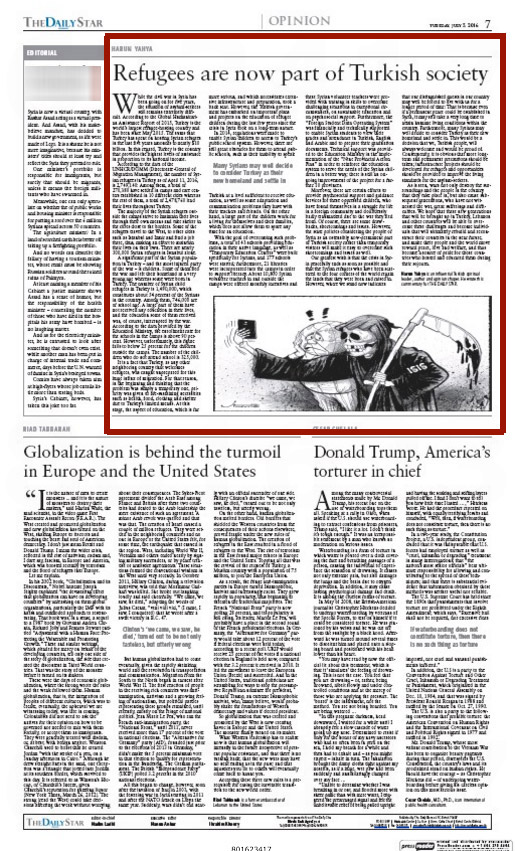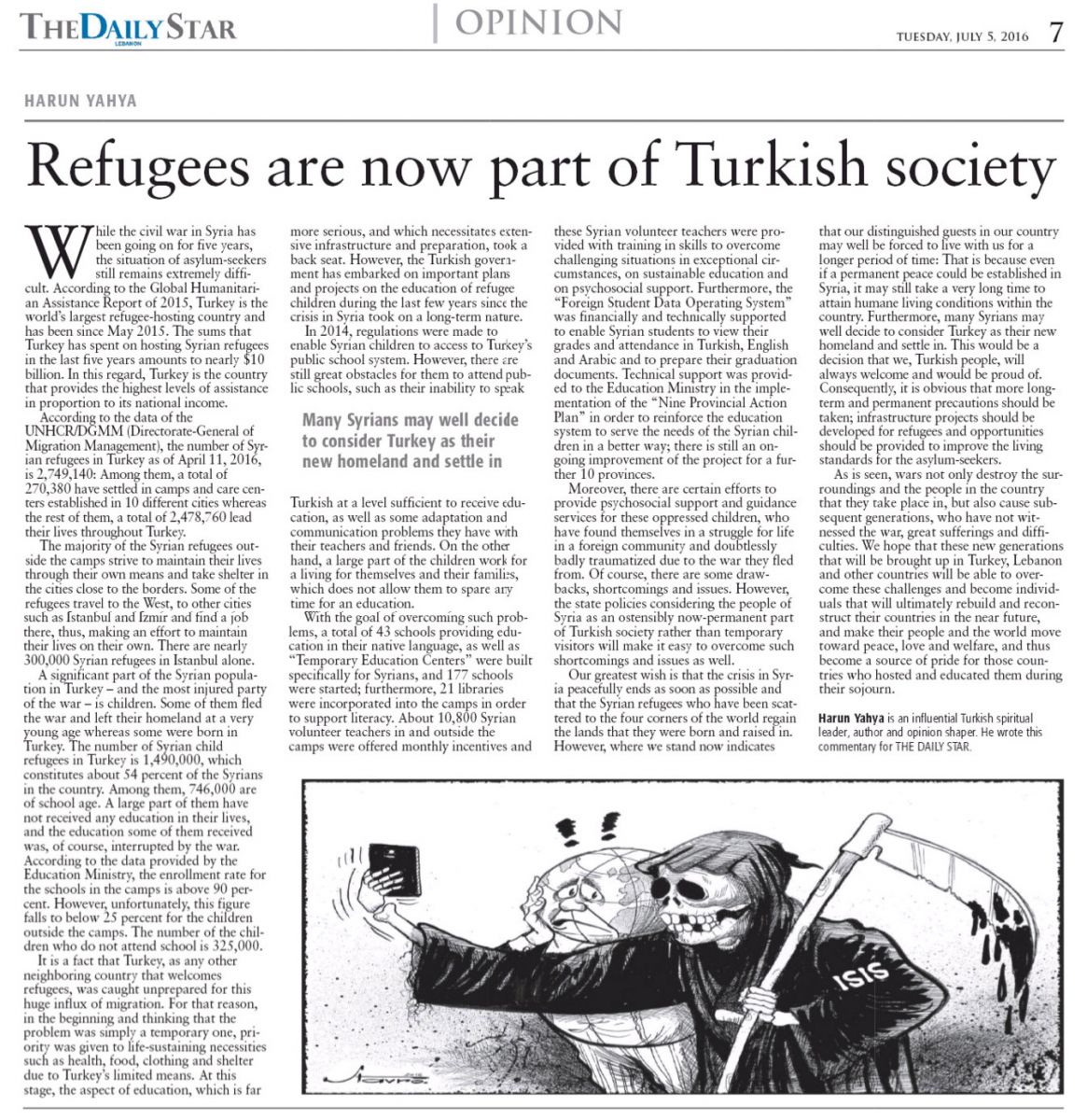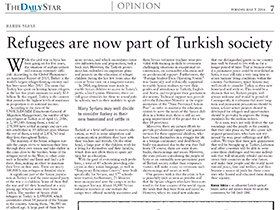
While the civil war in Syria has been going on for five years, the situation of asylum seekers still remains extremely difficult. According to the Global Humanitarian Assistance Report of 2015 (p. 38), Turkey is the world’s largest refugee-hosting country and has been since May 2015. The sums that Turkey has spent on hosting Syrian refugees in the last five years amounts to nearly $10 billion. In this regard, Turkey is the country that provides the highest levels of assistance in proportion to its national income.
According to the data of the UNHCR/DGMM (Directorate-General of Migration Management), the number of Syrian refugees in Turkey as of April 11th 2016, is 2,749,140: Among them, a total of 270,380 have settled in the camps and the care centers established in ten different cities whereas the rest of them, a total of 2,478,760 lead their lives throughout Turkey.
The majority of the Syrian refugees outside the camps strive to maintain their lives through their own means and take shelter in the cities close to the borders. Some of the refugees travel to the West, to other cities such as Istanbul and Izmir and find a job there, thus, making an effort to maintain their lives on their own. There are nearly 300,000 Syrian refugees in Istanbul alone.
A significant part of the Syrian population in Turkey - and the most injured party of the war - is children. Some of them fled the war and left their homeland at a very young age whereas some were born in Turkey. The number of Syrian child refugees in Turkey is 1,490,000, which constitutes about 54% of the Syrians in the country. Among them, 746,000 are of school age. A large part of them have not received any education in their lives, and the education some of them received was, of course, interrupted by the war. According to the data provided by the Ministry of Education, the enrollment rate for the schools in the camps is above 90%. However, unfortunately, this figure falls to below 25% for the children outside the camps. The number of the children who do not attend school is 325,000.
It is a fact that Turkey, as any other neighboring country that welcomes refugees, was caught unprepared for this huge influx of migration. For that reason, in the beginning and thinking that the problem was simply a temporary one, priority was given to life-sustaining necessities such as health, food, clothing, and shelter due to Turkey's limited means. At this stage, the aspect of education, which is far more serious, and which necessitates extensive infrastructure and preparation, took a back seat. However, the Turkish government has embarked on important plans and projects on the education of refugee children during the last few years since the crisis in Syria took on a long-term nature.
In 2014, regulations were made to enable Syrian children to access to Turkey's public school system. However, there are still great obstacles for them to attend public schools, such as their inability to speak Turkish at a level sufficient to receive education, as well as some adaptation and communication problems they have with their teachers and friends. On the other hand, a large part of the children work for a living for themselves and their families, which does not allow them to spare any time for an education.
With the goal of overcoming such problems, a total of 43 schools providing education in their native language, as well as “Temporary Education Centers” were built specifically for Syrians, and 177 schools were started; furthermore, 21 libraries were incorporated into the camps in order to support literacy. About 10,800 Syrian volunteer teachers in and outside the camps were offered monthly incentives and these Syrian volunteer teachers were provided with training in skills to overcome challenging situations in exceptional circumstances, on sustainable education and on psycho-social support. Furthermore, the “Foreign Student Data Operating System” was financially and technically supported to enable Syrian students to view their grades and attendance in Turkish, English and Arabic and to prepare their graduation documents. Technical support was provided to the Ministry of Education in the implementation of the "Nine Provincial Action Plan" in order to reinforce the education system to serve the needs of the Syrian children in a better way; there is still an on-going improvement of the project for a further 10 provinces.
Moreover, there are certain efforts to provide psycho-social support and guidance services for these oppressed children, who have found themselves in a struggle for life in a foreign community and doubtlessly badly traumatized due to the war they fled from. Of course, there are some drawbacks, shortcomings and issues. However, the state policies considering the people of Syria as an ostensibly now-permanent part of Turkish society rather than temporary visitors will make it easy to overcome such shortcomings and issues as well.
Our greatest wish is that the crisis in Syria peacefully ends as soon as possible and that the Syrian refugees who have been scattered to the four corners of the world regain the lands that they were born and raised in. However, where we stand now indicates that our distinguished guests in our country may well be forced to live with us for a longer period of time: That is because even if a permanent peace could be established in Syria, it may still take a very long time to attain humane living conditions within the country. Furthermore, many Syrians may well decide to consider Turkey as their new homeland and settle in. This would be a decision that we, Turkish people, will always welcome and would be proud of. Consequently, it is obvious that more long-term and permanent precautions should be taken; infrastructure projects should be developed for refugees and opportunities should be provided to improve the living standards for the asylum seekers.
As is seen, wars not only destroy the surroundings and the people in the country that they take place in, but also cause subsequent generations, who have not witnessed the war, great sufferings and difficulties. We hope that these new generations that will be brought up in Turkey, Lebanon and other countries will be able to overcome these challenges and become individuals that will ultimately rebuild and reconstruct their countries in the near future, and make their people and the world move towards peace, love and welfare, and thus become a source of pride for those countries who hosted and educated them during their sojourn.
Adnan Oktar's piece in The Daily Star:



